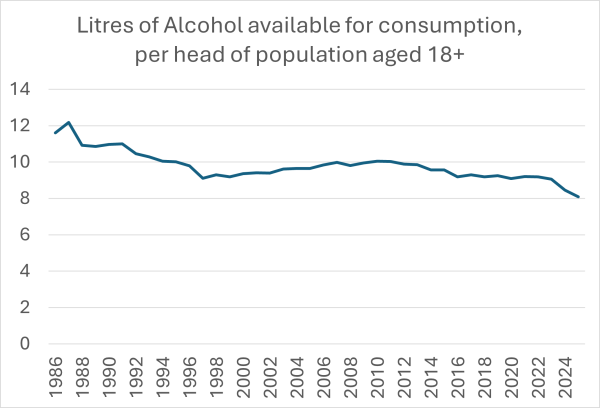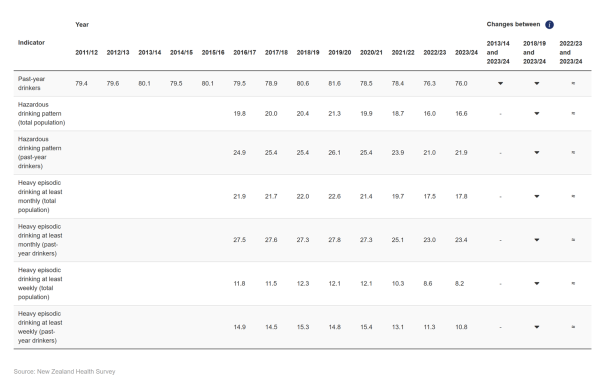Some things are legitimately confusing.
Canada’s low-risk drinking guidelines are not confusing. They are readily available on Health Canada’s website for anyone who cares to ask Google: up to fifteen standard Canadian drinks per week for men (three per day, four on special occasions), ten for women (two per day, 3 on special occasions, avoid while pregnant).
But the discussion around them has been confused.
RNZ’s Guyon Espiner claimed that “the maximum number of drinks recommended per week to stay low-risk (for men and women) is set at two in Canada” and that safe drinking guidelines in Canada had reduced in recent years.
On Newsroom-RNZ co-production The Detail, Espiner noted that “there’s some debate about what’s official and what’s not official” while damning New Zealand for not following Canadian examples.
While Canada’s official guidelines look similar to ours, Canada’s standard drink measure is 34.5% larger than New Zealand’s. If we take that into account, Canada’s low-risk guidelines are more liberal than New Zealand’s. Three standard Canadian drinks is four standard New Zealand drinks.
If New Zealand followed Canada’s example, we would be relaxing our guidelines rather than tightening them. And Canada’s guidelines have not changed since 2011.
So what is going on?
The Canadian government commissioned the Canadian Centre for Substance Use and Addiction [CCSA] to review the low-risk drinking guidelines. They had also helped prepare Canada’s 2011 guidelines, which remain the current official Health Canada guidance.
The CCSA’s report was released in 2023. It recommended an upper limit of no more than two drinks per week. That report was quickly criticised by experts like Brock University’s Dan Malleck, who pointed out that the CCSA based its findings on only sixteen of over five thousand papers on alcohol and health risks.
Sometimes, commissioned reports are just a little off and governments do well to ignore them. There is risk involved in putting out well-meaning but nonsensical advice. It trains a lot of people to ignore all advice. And some advice is very much worth heeding. Heavy drinking in pregnancy is very bad.
In November of last year, and again in January of this year, Canada’s Minister of Mental Health and Addictions confirmed that the 2011 guidelines remain Canada’s guidelines.
While light drinking is associated with higher risk of some cancers, it is also associated with lower risk of disorders like cardiovascular disease. At worst, the overall effect is a wash for drinking within current guidelines. And there remains good reason to think that light drinking overall provides minor protective effects, particularly for older people.
It is always possible that Health Canada will update its guidance in future; the guidelines remain under review. But it has not yet chosen to do so.
Consequently, Radio New Zealand’s infographic comparing guidelines across countries, with no mention of that the illustrated 2 drinks per week in Canada is not the actual Health Canada guidance, is more than a little misleading.
It gets more interesting.
Espiner, at RNZ in May, and again on The Detail, links industry correspondence with the Ministry of Health to an update to the Health NZ guidance on safe alcohol limits.
He details OIA correspondence in which Health New Zealand cites the ‘recently lowered’ Canadian guidelines as reason for tightening New Zealand’s guidelines. Clearly Health NZ had misinterpreted the state of play in Canada, presumably innocently. After correspondence with industry, the Ministry of Health’s Ross Bell intervened.
And in a late corrective note on the more recent RNZ article, the Brewers’ Association’s Dylan Firth is quoted as saying that they had raised the issue because the Ministry of Health’s website incorrectly claimed that Canada had changed its guidance.
Industry intervention apparently helped our Ministry of Health and Health New Zealand avoid an error. If the Canadian government has not considered the CCSA’s proposed guidelines are worth implementing, perhaps we should be just a bit more cautious.
At the Newsroom-RNZ episode of The Detail, Espiner damns the Ministry for listening to industry. He cites the Framework Convention on Tobacco Control limiting government interaction with the tobacco industry. But had that restriction applied to alcohol, a substantial error in Health New Zealand’s thinking might not have been caught.
And while Newsroom has provided minor clarification noting that Canadian guidelines have not actually been altered, it does not mention that current New Zealand guidelines are stricter than Canada’s current guidelines.
No one listening to that NZ On Air funded episode of The Detail will know that industry intervention helped to correct an error. Or that, if we followed Canada’s actual example, our low-risk threshold would increase from 15 to 20 standard New Zealand drinks per week.
About five years ago, misinformation was almost a capital crime. Times change.
Meanwhile, Statistics New Zealand shows the year to March 2025 had the lowest amount of alcohol available for consumption, per capita, since 1986.

Click to view
And the most recent NZ Health Survey shows an across-the-board decline in different measures of riskier drinking as compared to 2016/17, when their data started.

Click to view
Some things are legitimately confusing. Canada’s alcohol guidelines are not confusing.
But just what Radio New Zealand thinks it is doing in its odd publicly funded temperance campaign is at least a little confusing.
RNZ’s Guyon Espiner claimed that “the maximum number of drinks recommended per week to stay low-risk (for men and women) is set at two in Canada” and that safe drinking guidelines in Canada had reduced in recent years.
On Newsroom-RNZ co-production The Detail, Espiner noted that “there’s some debate about what’s official and what’s not official” while damning New Zealand for not following Canadian examples.
While Canada’s official guidelines look similar to ours, Canada’s standard drink measure is 34.5% larger than New Zealand’s. If we take that into account, Canada’s low-risk guidelines are more liberal than New Zealand’s. Three standard Canadian drinks is four standard New Zealand drinks.
If New Zealand followed Canada’s example, we would be relaxing our guidelines rather than tightening them. And Canada’s guidelines have not changed since 2011.
So what is going on?
The Canadian government commissioned the Canadian Centre for Substance Use and Addiction [CCSA] to review the low-risk drinking guidelines. They had also helped prepare Canada’s 2011 guidelines, which remain the current official Health Canada guidance.
The CCSA’s report was released in 2023. It recommended an upper limit of no more than two drinks per week. That report was quickly criticised by experts like Brock University’s Dan Malleck, who pointed out that the CCSA based its findings on only sixteen of over five thousand papers on alcohol and health risks.
Sometimes, commissioned reports are just a little off and governments do well to ignore them. There is risk involved in putting out well-meaning but nonsensical advice. It trains a lot of people to ignore all advice. And some advice is very much worth heeding. Heavy drinking in pregnancy is very bad.
In November of last year, and again in January of this year, Canada’s Minister of Mental Health and Addictions confirmed that the 2011 guidelines remain Canada’s guidelines.
While light drinking is associated with higher risk of some cancers, it is also associated with lower risk of disorders like cardiovascular disease. At worst, the overall effect is a wash for drinking within current guidelines. And there remains good reason to think that light drinking overall provides minor protective effects, particularly for older people.
It is always possible that Health Canada will update its guidance in future; the guidelines remain under review. But it has not yet chosen to do so.
Consequently, Radio New Zealand’s infographic comparing guidelines across countries, with no mention of that the illustrated 2 drinks per week in Canada is not the actual Health Canada guidance, is more than a little misleading.
It gets more interesting.
Espiner, at RNZ in May, and again on The Detail, links industry correspondence with the Ministry of Health to an update to the Health NZ guidance on safe alcohol limits.
He details OIA correspondence in which Health New Zealand cites the ‘recently lowered’ Canadian guidelines as reason for tightening New Zealand’s guidelines. Clearly Health NZ had misinterpreted the state of play in Canada, presumably innocently. After correspondence with industry, the Ministry of Health’s Ross Bell intervened.
And in a late corrective note on the more recent RNZ article, the Brewers’ Association’s Dylan Firth is quoted as saying that they had raised the issue because the Ministry of Health’s website incorrectly claimed that Canada had changed its guidance.
Industry intervention apparently helped our Ministry of Health and Health New Zealand avoid an error. If the Canadian government has not considered the CCSA’s proposed guidelines are worth implementing, perhaps we should be just a bit more cautious.
At the Newsroom-RNZ episode of The Detail, Espiner damns the Ministry for listening to industry. He cites the Framework Convention on Tobacco Control limiting government interaction with the tobacco industry. But had that restriction applied to alcohol, a substantial error in Health New Zealand’s thinking might not have been caught.
And while Newsroom has provided minor clarification noting that Canadian guidelines have not actually been altered, it does not mention that current New Zealand guidelines are stricter than Canada’s current guidelines.
No one listening to that NZ On Air funded episode of The Detail will know that industry intervention helped to correct an error. Or that, if we followed Canada’s actual example, our low-risk threshold would increase from 15 to 20 standard New Zealand drinks per week.
About five years ago, misinformation was almost a capital crime. Times change.
Meanwhile, Statistics New Zealand shows the year to March 2025 had the lowest amount of alcohol available for consumption, per capita, since 1986.

Click to view
And the most recent NZ Health Survey shows an across-the-board decline in different measures of riskier drinking as compared to 2016/17, when their data started.

Click to view
Some things are legitimately confusing. Canada’s alcohol guidelines are not confusing.
But just what Radio New Zealand thinks it is doing in its odd publicly funded temperance campaign is at least a little confusing.
Dr Eric Crampton is Chief Economist with the New Zealand Initiative. One of the Initiative’s 90 members is in the alcohol industry; they were not consulted in writing this piece. However, Eric did confirm aspects of correspondence and timelines with Dylan Firth.
Dr Eric Crampton is Chief Economist at the New Zealand Initiative. This article was first published HERE


3 comments:
Guyon is a reformed alcoholic who thinks everyone else should also be one. He is on a bandwagon and as a NZ leftie journalist he cant see any other point of view.
The messaging around alcohol consumption has been very bad over the last few years. Guyon has contributed in a big way. He needs to learn how to do research and write facts. You're never too old Guyon.
Who pays any attention to the dire warnings about The Good Oil anyway? Consumers respond to price rather than health scares. I like my Scotch and have a few before bed. I will continue doing that unless it is priced out of my reach. I am sure I speak for the overwhelming majority of people who enjoy their tipple.
Why are you taking any notice of anything on RNZ ?
The arrogant Maori spouting Espiner?
Give me a break !!!
Post a Comment
Thank you for joining the discussion. Breaking Views welcomes respectful contributions that enrich the debate. Please ensure your comments are not defamatory, derogatory or disruptive. We appreciate your cooperation.